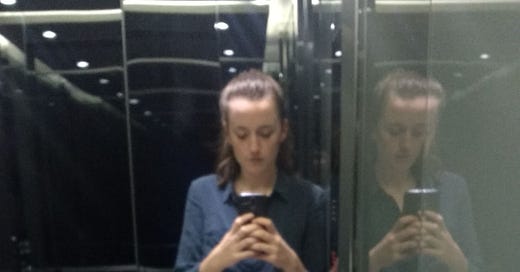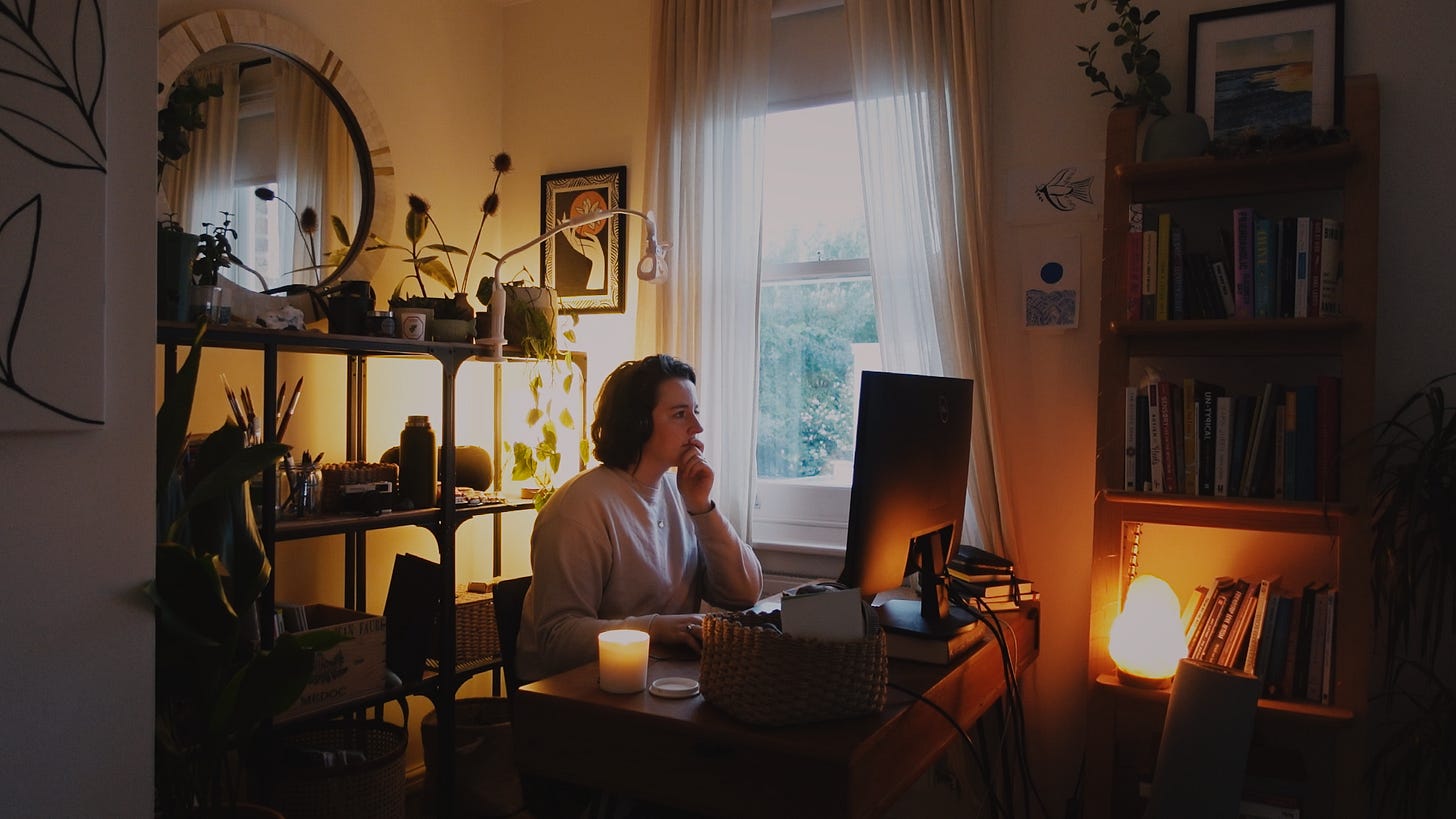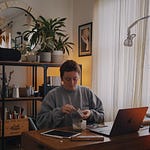Hey Wildlings —
Welcome back to The Rewilding Journals Podcast. Today I’m going to share a little bit about what I do (or don’t do) for work. This is a question that I frequently receive Instagram DMs about and whilst I don’t feel comfortable (or have the spoons) to go into detailed replies there, I would like to write and speak about it here at The Rewilding Journals with you because it’s a big part of my story. It’s also something that is a work-in-progress. I don’t have solid and dependable answers, but fluid and uncertain musings as I navigate my rewilding journey.
I decided to be a lawyer when I was 19 and dedicated much of my 20s trying to be the best lawyer I could be. I quit this career in the early Summer last year, just after turning 30. I wrote about my journey to quitting here, minus a very important detail which I wasn’t yet ready to share publicly: I had just found out I’m autistic and suddenly understood why I had been struggling with my job for so long, and the gravity of the autistic and occupational burnout I was in.
To boil the story down to the bare bones for you; after struggling with mental health issues for my entire working career, I finally walked out of the office one day after a particularly bad panic attack (which I now see was most likely a meltdown followed by a shutdown), and I never went back. My GP diagnosed me with an anxiety disorder (again) and occupational burnout and granted me sick leave. I went to bed and didn’t get up for a couple of months. In that time it quickly became apparent that I would not be able to go back to work. I couldn’t speak, I couldn’t cook, I couldn’t regulate my emotions, I couldn’t remember things, I couldn’t get out of bed, I couldn’t be around people, I couldn’t look after myself. I had always struggled with these things, but overnight I had completely lost the ability to ‘just push through’ and I felt as if if I went back to work I wouldn’t make it.
So I didn’t go back. I handed in my notice without explanation. Not one of my colleagues reached out. And I haven’t spoken to anyone at the company since. I didn’t give them much, if any, information so I don’t blame them - they were probably incredibly confused to be ghosted by an employee that on the surface seemed to have it together. But I mention it because, to me, it shows just how little anyone knew me despite working there in very small teams for four years. Ah, the incredible power of masking (not in a good way).
To be honest, I remember very little of that time. I was in the pits. One question I remember repeating over and over in my head, though, was ‘why did I do this to myself?’. It felt crushing to acknowledge that I had known deep down in the pit of my stomach for years that this job was slowly killing me, but it took me snapping in two to admit to myself that I had no choice but to leave.
I am working on having compassion for myself, especially now I know that I am autistic and was unconsciously masking, but it is a question that still haunts me from time-to-time. I can’t help but think, ‘If I knew earlier that I am autistic, would I be this sick?’. But then I think, ‘If I knew earlier that I am autistic, I wouldn’t have been a lawyer and therefore I wouldn’t have met my husband or indirectly welcomed the other amazing things into my life that I’m fortunate to have because I was ‘able’ to mask my way through a career in law, so was it worth it?’. It’s tricky. And, honestly, these are not questions that are answerable. It happened. I’m here. I need to move on.
Now, 10 months or so down the line and with the knowledge that I am autistic (and most likely also ADHD), I am actively prioritising my recovery from burnout. I remain unemployed. I am not certain about the future of work for me, but one thing I know for a fact is that I won’t be going back to law.
Many fellow late-diagnosed neurodivergent folk face employment issues, with autistic people facing the ‘highest rates of unemployment of all disabled groups’ according to an article published by Autistica in 2021. In fact, just 21.7% of autistic people are in employment. So the unfortunate truth is that I’m not alone in being unemployed. In fact, I don’t count myself as unfortunate within our community in this regard because I am lucky enough to have had savings from my job that have allowed me to alleviate the financial stress of being unemployed (though, of course, I am painfully aware that I am spending the money I burned myself out making on my recovery, which just seems like total nonsense).
Anyway, over the last few weeks I have noticed that my mind has started to turn to the future and what it might hold for me in regards to work. I was fascinated to see that the ‘old’ version of me that used to look to the future and think about what career choice would look best on paper or make the people around me happy or impressed or be the most financially sustaining was standing in the background. The ‘new’ version of me was in the foreground holding a megaphone telling me very clearly to prioritise my own needs and desires this time. A life lesson I never want to learn again is that there is no point in following dreams that aren’t yours; the risk of losing yourself in the process is not worth it.
I find myself thinking about what work I could do that would still allow me to be myself and look after myself. I know I want to work, I just don’t know what I can do without making myself incredibly sick again (and, to be quite frank, I’m terrified to test the waters). I made a list of my needs when it comes to work, which looks something like this (though it may change):
To work for myself.
To work from home.
To work flexibly.
To work independently.
To be creative.
To work with a special interest.
To avoid interaction with corporate jargon as far as possible.
To help people.
To be part of a community.
A tall order, but one which I’m committed to.
I hope to lean into my special interests and my passions.
I hope to sustain myself through work that does not simultaneously tear me down.
I hope to be grateful for what I can do, not just cognisant of what I can’t.
I hope to remain committed to my needs.
I hope to recover, even if who I recover to be is different than before.
I hope to live out the truth that work does not define me.
I hope to continue to share my internal world.
I hope to maintain my identity independent of my work.
I hope to connect.
I hope to unequivocally be myself.
How has your relationship with work changed since you discovered you are autistic or otherwise neurodivergent? What are your needs when it comes to work? Have you found work that suits your needs?
If you have any questions about what I’ve shared today please feel free to leave them in the comments, or you can email me at charlierewilding@gmail.com (just please include reference to this post so I know what you’re emailing about).





















Share this post